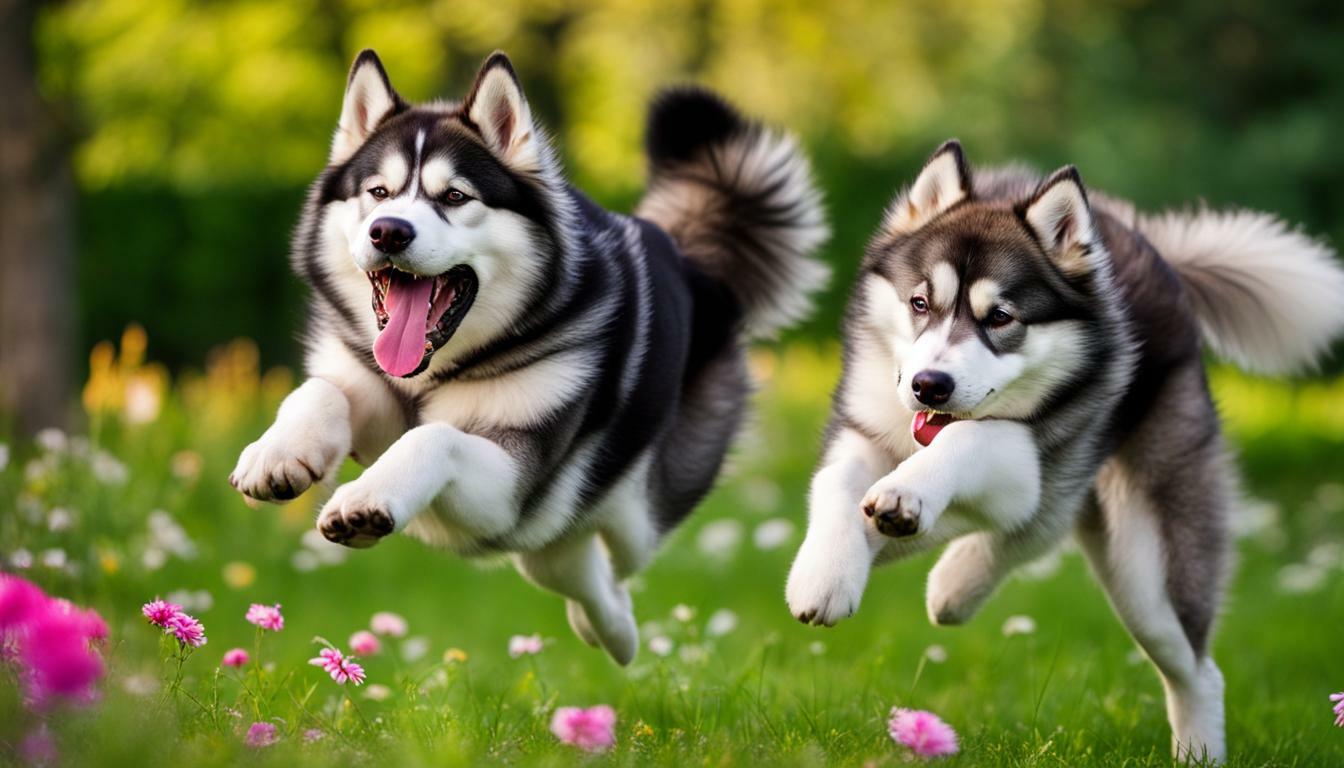Alaskan Malamutes have gained a reputation for their majestic appearance, but are they truly dangerous?
Contrary to popular belief, Alaskan Malamutes are not inherently dangerous. In fact, they are known for their loyalty, playfulness, and confidence, making them beloved pets for many families. Despite their tough exterior, these dogs are friendly and sociable with people, especially when provided with proper training and socialization.
Aggression in Alaskan Malamutes is usually a result of neglect or negative experiences. By providing them with the right care, love, and attention, you can ensure their well-being and prevent any aggressive behaviors.
While Alaskan Malamutes may not be naturally inclined to be guard dogs, their size and appearance can be intimidating to outsiders. However, their friendly and sociable nature may not make them suitable for guarding or protection purposes.
It’s important to note that Alaskan Malamutes have a high prey drive due to their breeding as sled dogs. This means that they may have a natural instinct to chase small animals. When introducing them to other pets, caution and proper supervision are necessary to ensure the safety of all animals involved.
In addition to their temperament, grooming and exercise are crucial for the overall well-being of Alaskan Malamutes. Regular grooming helps maintain their thick coat and prevent matting, while daily exercise keeps them physically and mentally stimulated.
Like any breed, Alaskan Malamutes may have genetic predispositions to certain health conditions, such as hip dysplasia and dental problems. Regular visits to the veterinarian and proper care can help address and manage these issues.
In conclusion, Alaskan Malamutes can be loving and loyal companions when provided with proper care and attention. Their reputation for being dangerous is largely unfounded, and by understanding their temperament and needs, they can be wonderful additions to any family.
Understanding Alaskan Malamute Temperament
Alaskan Malamutes have a unique temperament that sets them apart from other dog breeds. While they may have a tough exterior, they are known for their friendly and sociable nature. These confident and playful dogs make great companions for families who are willing to provide them with the care, attention, and training they require.
Aggressive behaviors in Alaskan Malamutes are not a result of their inherent nature but rather a product of neglect or negative experiences. Proper training and socialization are key in preventing such behaviors. It is essential to start training Malamutes from an early age and expose them to various people, environments, and situations to ensure they grow up to be well-behaved and balanced dogs.
When it comes to guarding capabilities, Alaskan Malamutes may not be the best choice. While their size and appearance may appear intimidating, they are generally not inclined to be guard dogs. Their friendly and sociable nature makes them more suitable as loving family pets rather than protective guardians.
Prey Drive and Introduction to Other Pets
Due to their breeding as sled dogs, Alaskan Malamutes have a high prey drive. They have a natural instinct to chase small animals, which can be a consideration when introducing them to other pets in your household. It is important to exercise caution and provide proper supervision when introducing them to smaller animals such as cats or rabbits. With the right approach and gradual introductions, it is possible for Alaskan Malamutes to coexist peacefully with other pets.
| Key Points: | |
|---|---|
| Alaskan Malamutes have a unique temperament that sets them apart from other dog breeds. | They are friendly and sociable with people. |
| Aggressive behaviors in Malamutes are usually a result of neglect or negative experiences. | Proper training and socialization are crucial in preventing aggression. |
| While they may appear intimidating, Malamutes are not typically good guard dogs. | Their friendly and sociable nature makes them better suited as family pets. |
| Alaskan Malamutes have a high prey drive and may chase small animals. | Caution and proper introductions are needed when introducing them to other pets in the household. |
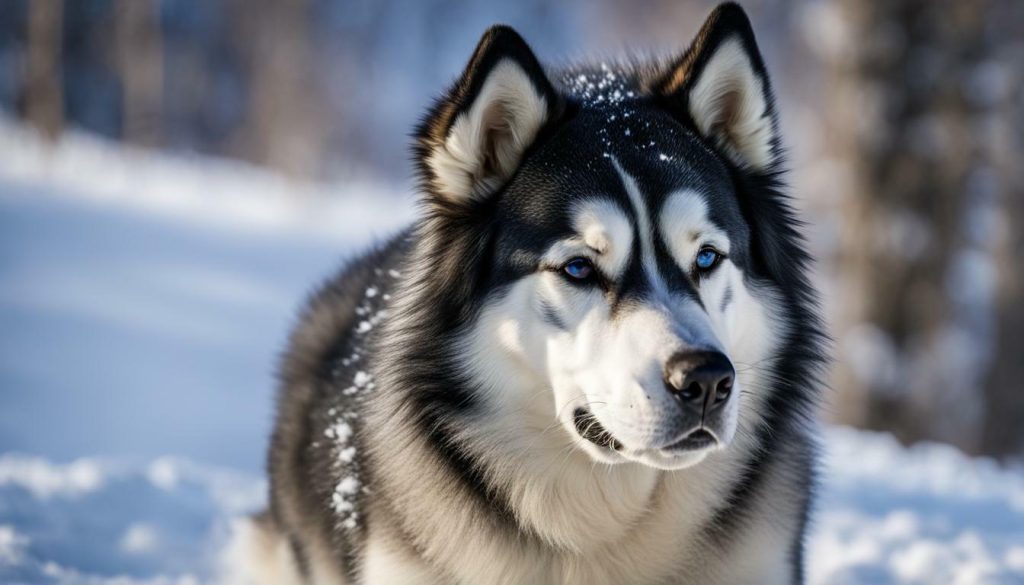
Understanding the temperament of Alaskan Malamutes is essential for anyone considering these magnificent dogs as companions. With the right care, training, and socialization, Alaskan Malamutes can be loving, loyal, and well-behaved pets that bring joy and happiness to your family.
The Role of Training in Alaskan Malamute Behavior
Training plays a crucial role in shaping the behavior of Alaskan Malamutes and maintaining a harmonious relationship with them. These loyal and playful dogs have a confident nature that can be further developed through proper training and socialization. While they may have a tough exterior, Alaskan Malamutes are generally friendly and sociable with people, but aggression can occur if they are not adequately trained and socialized.
It is essential to start training Alaskan Malamutes from a young age to establish good behavior patterns and prevent potential aggression. Positive reinforcement methods work best with these intelligent dogs, using rewards and praise to reinforce desired behaviors. Consistency, patience, and perseverance are key when training a Malamute, as they have a strong independent streak.
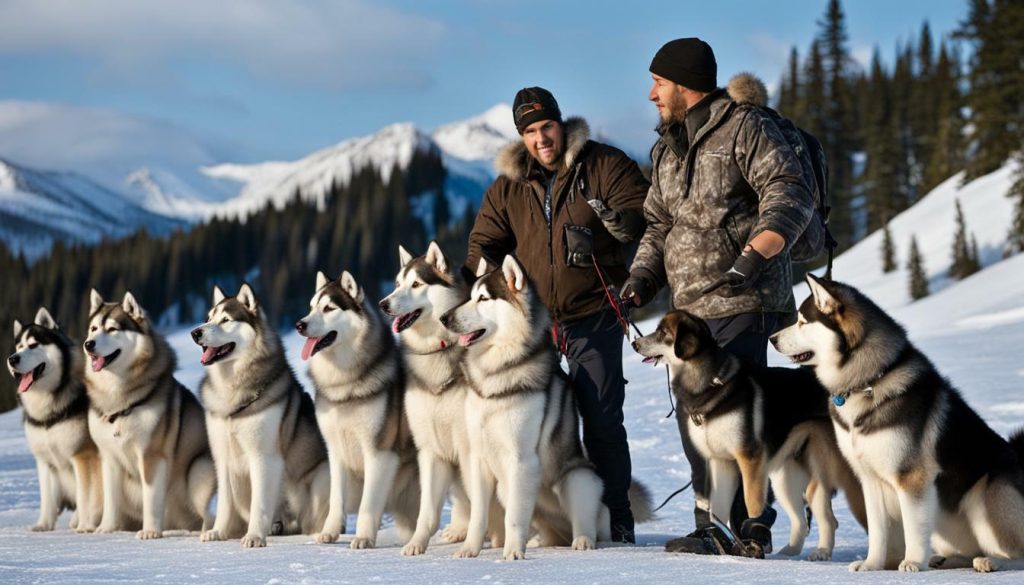
“Proper training and socialization are vital for Alaskan Malamutes to prevent aggression and foster obedience.”
While Alaskan Malamutes are not typically good guard dogs due to their friendly and sociable nature, they may appear intimidating to strangers because of their size. Training can help manage their protective instincts and teach them appropriate behaviors when encountering new people or situations. Additionally, their high prey drive may lead them to chase small animals, so introducing them to other pets in the household requires caution and careful supervision.
By providing proper training and socialization, Alaskan Malamutes can become loving and loyal companions. They thrive on positive interactions and attention from their owners. Grooming and exercise are also essential aspects of their care, ensuring their physical and mental well-being. Regular vet check-ups and proper nutrition are crucial to address potential genetic health conditions that Malamutes may be prone to.
The Key Takeaway
Training and socialization play a vital role in shaping the behavior of Alaskan Malamutes. By starting early and using positive reinforcement methods, owners can prevent aggression and foster obedience in these intelligent dogs. Proper training also helps manage their protective instincts and prey drive. With the right care, Alaskan Malamutes can become loving and loyal companions, bringing joy and companionship to their owners’ lives.
Alaskan Malamutes as Family Pets
Alaskan Malamutes have a natural affinity for family life and can bring immense joy to households. Despite their large size and striking appearance, these dogs are known for their loyalty, playfulness, and companionship. They form strong bonds with their human families and are often described as gentle giants.
When properly cared for, Alaskan Malamutes can be loving and devoted family pets. They thrive in a home environment where they can receive the attention and affection they crave. Their playful nature makes them great companions for children, as they are known to be patient and tolerant with younger family members.
One of the standout traits of Alaskan Malamutes is their loyalty. They are fiercely dedicated to their owners and will go to great lengths to protect and comfort them. Whether it’s a game of fetch in the backyard or a cozy evening snuggle on the couch, these dogs are always eager to spend quality time with their loved ones.
It’s important to remember that Alaskan Malamutes require consistent training and socialization to thrive in a family setting. Their confident and independent nature needs guidance and structure from their owners. With the right approach, these dogs can be well-behaved and obedient, making them a cherished member of the family.
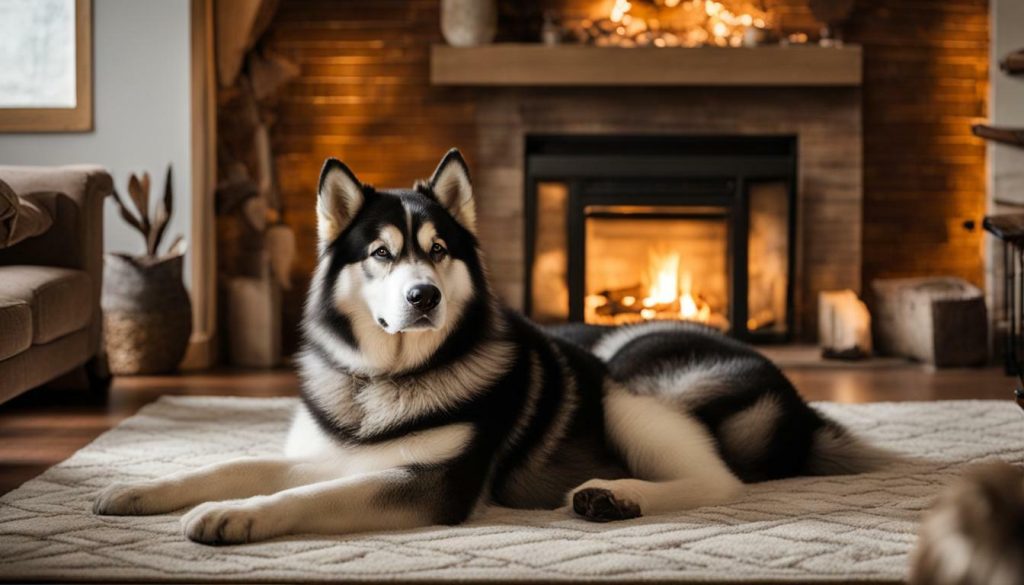
| Pros | Cons |
|---|---|
| • Loyal and devoted companions | • Require proper training and socialization |
| • Playful and patient with children | • Need regular exercise and mental stimulation |
| • Form strong bonds with their human families | • May have a high prey drive |
“Alaskan Malamutes are the perfect addition to any loving family. Their loyal and playful nature brings so much happiness and laughter into our home. They truly are the best companions!” – Sarah, Alaskan Malamute owner
Alaskan Malamutes and Guard Dog Capabilities
Despite their imposing size, Alaskan Malamutes are not typically suited to be guard dogs. While their appearance may be intimidating, these gentle giants are known for their friendly and sociable nature, making them better suited as loving family pets. They are loyal, playful, and confident dogs that form strong bonds with their human families.
“Alaskan Malamutes are not guard dogs in the typical sense,” says pet behavior expert, Dr. Sarah Thompson. “Their temperament and natural disposition lean towards being sociable rather than protective. They are more likely to greet strangers with wagging tails and slobbery kisses rather than aggression.”
Alaskan Malamutes are known for their friendly and approachable demeanor. They have a strong desire for human companionship and thrive in a loving and attentive home environment.
While Alaskan Malamutes may not be ideal guard dogs, their size and presence can still serve as a deterrent to potential intruders. However, it’s important to note that their primary instinct is to be gentle and affectionate rather than aggressive.
Preventing aggression and promoting sociability
To ensure your Alaskan Malamute remains a well-behaved and sociable companion, early and consistent training is crucial. Positive reinforcement techniques, such as reward-based training, can be highly effective in shaping their behavior. Additionally, proper socialization from a young age will help them feel comfortable around other people and animals.
| Training Tips | Socialization Tips |
|---|---|
| Use positive reinforcement, such as treats and praise, to reward good behavior. | Expose your Alaskan Malamute to various environments, people, and animals to help them become well-adjusted. |
| Be consistent and patient in your training efforts. | Arrange supervised playdates with other dogs to encourage positive interactions. |
| Enroll your Malamute in obedience classes to enhance their training. | Introduce them to new experiences gradually, ensuring they feel safe and supported. |
By providing the right training, socialization, and care, Alaskan Malamutes can thrive as loving and loyal companions, bringing joy and warmth to your home.
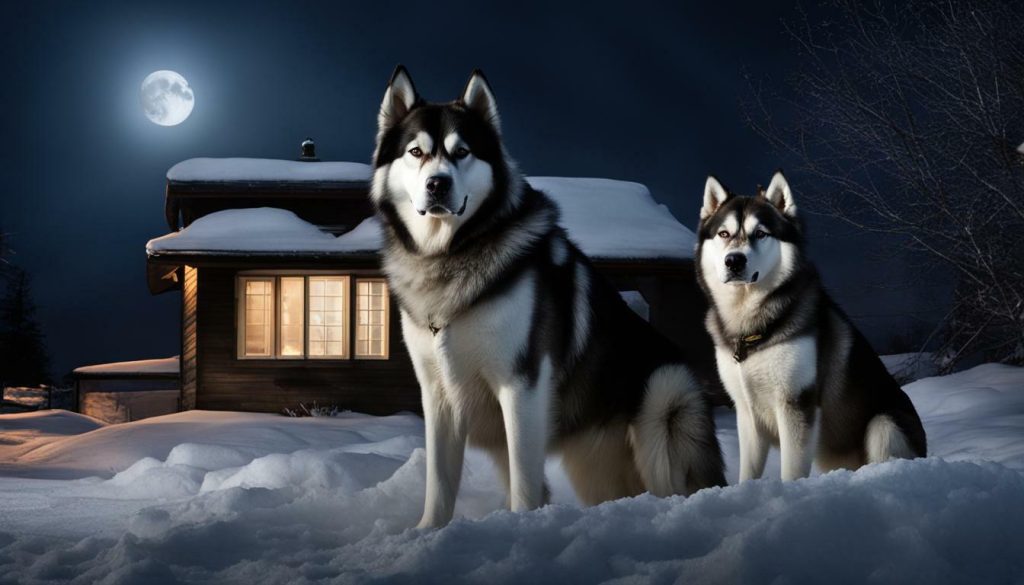
Alaskan Malamutes possess a strong prey drive that can affect their interactions with other animals. This instinctual behavior stems from their breeding as sled dogs, where they were trained to chase and hunt small prey. It’s important to understand and manage this aspect of their temperament when introducing them to other pets.
“While Alaskan Malamutes may have a natural inclination to chase small animals, it doesn’t mean they can’t coexist with other pets,” says Dr. Sarah Adams, a veterinarian specializing in dog behavior.
“With proper training, socialization, and supervision, Alaskan Malamutes can learn to live harmoniously with other animals in the household.”
| Introducing Alaskan Malamutes to other pets: |
|---|
| 1. Start with controlled introductions: Gradually introduce your Alaskan Malamute to other pets in a controlled environment, using leashes or barriers to ensure safety. |
| 2. Reward positive interactions: When your Alaskan Malamute displays calm and friendly behavior towards other animals, reward them with treats and praise to reinforce positive associations. |
| 3. Provide separate spaces: Initially, it’s important to give each pet their own space to retreat to, allowing them to acclimate to each other’s presence without feeling threatened. |
| 4. Supervise interactions: Always supervise interactions between your Alaskan Malamute and other pets until you are confident in their ability to coexist peacefully. |
Remember, every dog is an individual, and their ability to get along with other animals may vary. It’s essential to consider their prey drive when introducing them to new pets, and to seek guidance from a professional dog trainer or behaviorist if needed.
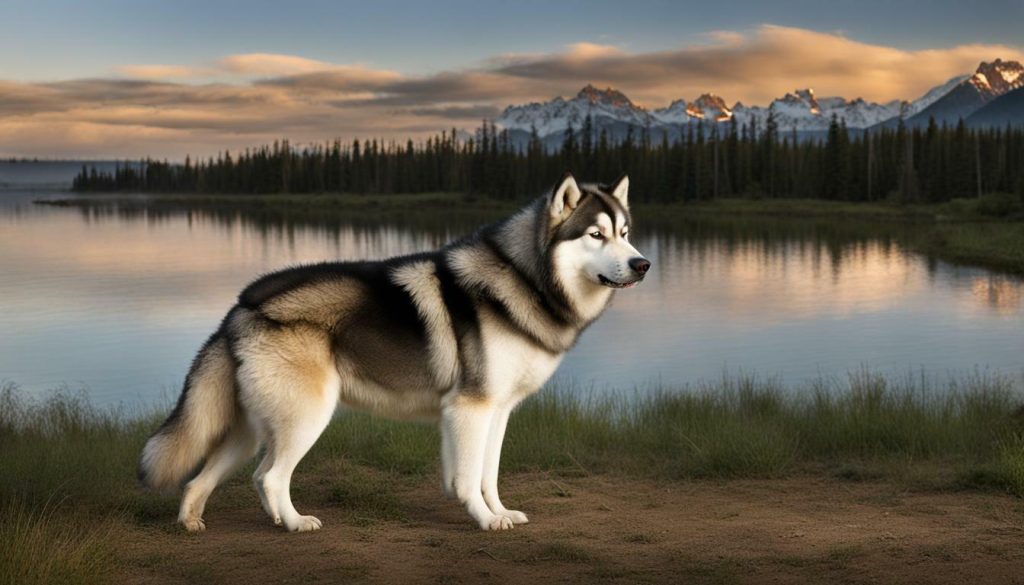
Maintaining proper grooming and exercise routines is essential for the well-being of Alaskan Malamutes. These beautiful and majestic dogs have a thick double coat that requires regular brushing to prevent matting and keep their fur healthy. A gentle slicker brush can be used to remove loose hair and keep their coat looking its best. Regular grooming sessions also provide an opportunity for bonding with your Malamute and can help prevent any skin issues or discomfort that may arise from neglecting their grooming needs.
In addition to grooming, Alaskan Malamutes need plenty of exercise to keep them happy and healthy. These dogs are bred for endurance, and they have a lot of energy to burn. Daily walks or runs, accompanied by playtime in a secure, fenced-in area, will help keep them mentally and physically stimulated. Engaging in activities that challenge their intellect, such as obedience training or participating in dog sports like agility or nose work, can also help satisfy their need for mental stimulation.
“Proper grooming and exercise routines are not only important for the physical well-being of Alaskan Malamutes but also for their mental well-being. Regular exercise and mental stimulation help prevent boredom and destructive behaviors.”
The Importance of Nail Care and Dental Hygiene
In addition to regular grooming and exercise, it is crucial to pay attention to your Malamute’s nail care and dental hygiene. Long nails can cause discomfort and even lead to joint issues, so trimming them regularly is essential. If you are unsure about how to properly trim your dog’s nails, consult a professional groomer or your veterinarian for guidance.
Dental hygiene is also crucial for the overall health of your Alaskan Malamute. Regular brushing with a canine toothbrush and toothpaste formulated specifically for dogs can help prevent dental diseases, such as gum infections and tooth decay. Providing your Malamute with appropriate chew toys or dental treats can also aid in maintaining good oral hygiene.
| Key Points: | Tips for Grooming and Exercise |
|---|---|
| 1 | Brush your Alaskan Malamute’s coat regularly to prevent matting and keep it healthy. |
| 2 | Engage in daily exercise to satisfy their energy needs and provide mental stimulation. |
| 3 | Pay attention to nail care and trim your Malamute’s nails regularly. |
| 4 | Brush your dog’s teeth and provide dental treats to maintain good oral hygiene. |
By following these grooming and exercise routines, you can ensure the well-being and happiness of your Alaskan Malamute. The love and care you provide will be rewarded with a loyal and affectionate companion who will bring joy to your life for years to come.
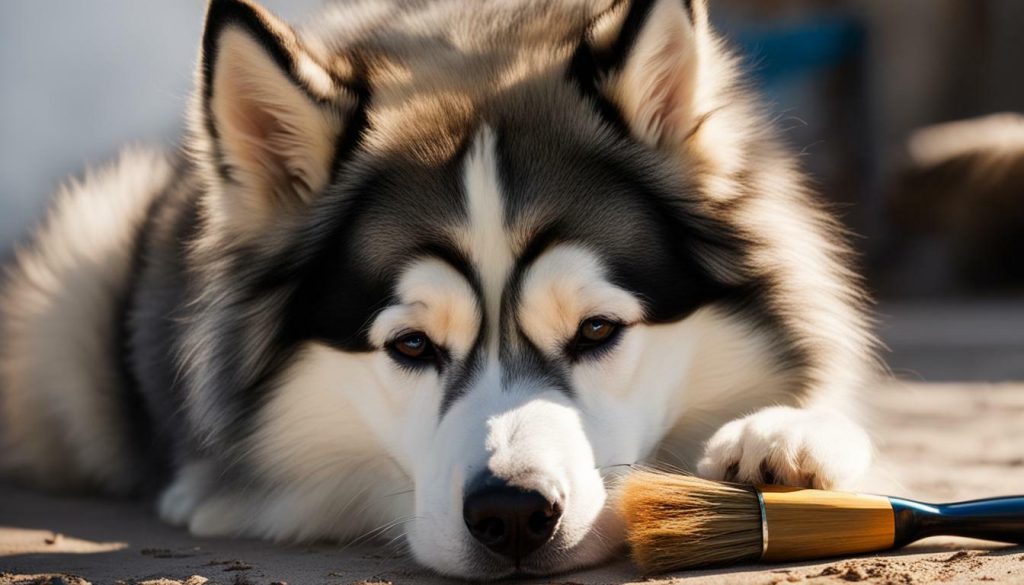
Like all breeds, Alaskan Malamutes can be susceptible to certain genetic health conditions that owners should be aware of. These conditions include hip dysplasia and dental problems, which are relatively common in this breed.
Hip dysplasia is a condition where the hip joints don’t develop properly. It can lead to pain, lameness, and arthritis in the affected dogs. Regular exercise, maintaining a healthy weight, and providing joint supplements can help manage this condition. Responsible breeders will typically screen their breeding dogs for hip dysplasia to minimize the risk in their offspring.
Dental problems, such as periodontal disease, can also occur in Alaskan Malamutes. The thick coat of the breed can make it challenging to spot dental issues, so it’s important for owners to regularly check their dog’s teeth and gums. Regular dental care, including brushing their teeth and providing dental chews, can help prevent dental problems in Alaskan Malamutes.
| Genetic Health Conditions | Symptoms | Prevention and Management |
|---|---|---|
| Hip dysplasia | Pain, lameness, stiffness, difficulty standing up or walking | Regular exercise, maintaining a healthy weight, joint supplements |
| Dental problems | Bad breath, inflamed gums, tartar buildup | Regular dental care, including brushing teeth and providing dental chews |
As with any breed, it’s essential to be aware of the potential genetic health conditions that Alaskan Malamutes may be prone to. Regular visits to the veterinarian, proper care, and early intervention can help manage these conditions and ensure the overall health and well-being of your Alaskan Malamute.
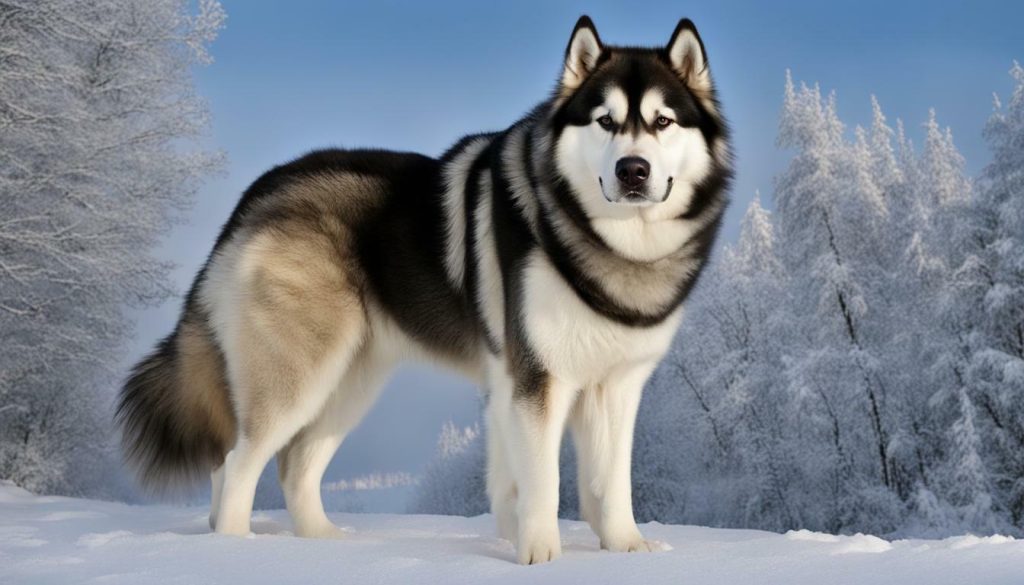
Providing adequate and responsible care is crucial for the overall health and happiness of Alaskan Malamutes. These beautiful dogs require a certain level of attention and commitment to ensure they thrive in a domestic environment. From grooming to exercise and regular vet check-ups, here’s what you need to know to care for your Alaskan Malamute.
First and foremost, grooming plays a vital role in keeping your Malamute’s thick coat healthy and free from matting. Their dense fur requires regular brushing to prevent tangles and the accumulation of dirt. Additionally, periodic baths are necessary to keep their coat clean and fresh. By dedicating time to grooming, you not only maintain their appearance but also promote good skin health.
Exercise is another critical aspect of caring for your Alaskan Malamute. These energetic dogs have strong endurance and love to explore the outdoors. Providing them with daily physical activity helps prevent behavioral problems that may arise from pent-up energy. Engaging in activities such as long walks, hiking, or even pulling a weighted sled can satisfy their need for exercise and mental stimulation.
Table 1: Daily Exercise Recommendations
| Age | Exercise Duration |
|---|---|
| Puppy (3-6 months) | 20-30 minutes (divided into shorter sessions) |
| Adult (1-7 years) | 1-2 hours |
| Senior (8+ years) | 30-60 minutes |
Regular visits to the veterinarian are essential to maintain your Alaskan Malamute’s overall well-being. These appointments allow for early detection of any potential health issues and ensure that preventive measures, such as vaccinations and parasite control, are up to date. Your veterinarian can also provide guidance on nutrition and address any specific concerns related to the breed, such as the predisposition to hip dysplasia.
Image Source:
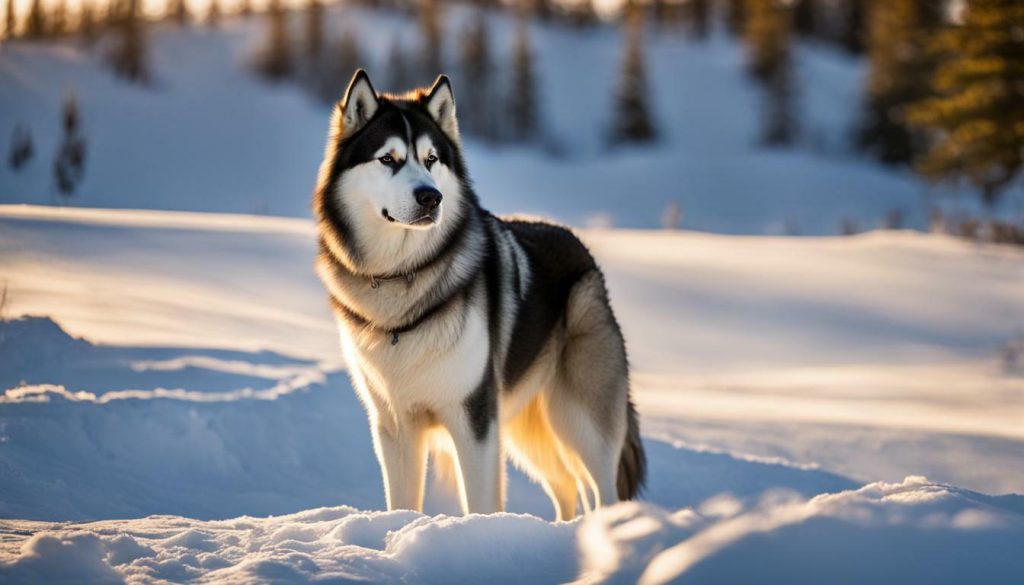
By providing proper care for your Alaskan Malamute, you create an environment where they can thrive and develop into loving and loyal companions. Remember, these dogs depend on you for their well-being, so it’s important to prioritize their grooming needs, provide ample exercise, and stay proactive about their veterinary care. With the right care and attention, your Alaskan Malamute can lead a happy and fulfilling life by your side.
Alaskan Malamutes as Loving and Loyal Companions
Alaskan Malamutes have a remarkable capacity for love and loyalty, making them exceptional companions. Despite their impressive size and robust appearance, these dogs are known for their gentle and affectionate nature. Their strong bond with their human family members is evident in their unwavering devotion and eagerness to please.
These loyal companions thrive on human interaction and make it their mission to be by your side through thick and thin. Whether you’re lounging on the couch or embarking on outdoor adventures, you can count on your Alaskan Malamute to be your most loyal and enthusiastic companion.
They are also well-known for their playful nature, and their joy is contagious. Their enthusiasm for life is evident in their boundless energy and their love for interactive games and outdoor activities. Alaskan Malamutes are always up for a game of fetch or a long hike in the great outdoors. Their playful demeanor makes them a perfect choice for families with active lifestyles.
As loving and loyal as they are, it is essential to reciprocate their devotion by providing them with the care and attention they deserve. Regular exercise, grooming, and veterinary care are crucial for their overall well-being. By meeting their needs and nurturing their love for you, you will have a faithful and devoted companion for life.
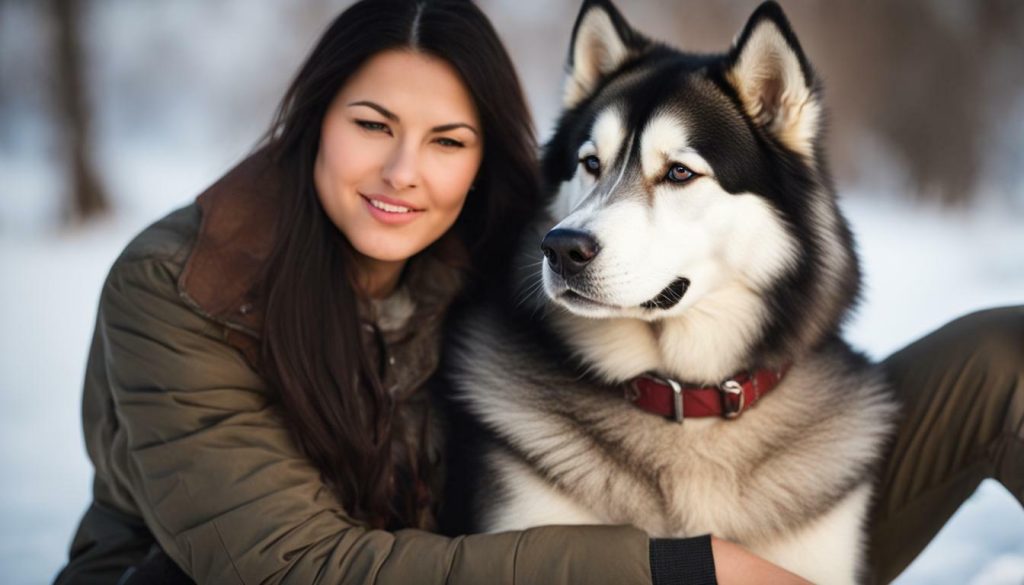
“My Alaskan Malamute has been my most loyal companion. Their unwavering love and loyalty are truly unmatched.” – Sarah, Malamute owner
“Alaskan Malamutes are not just pets; they become a part of your family. Their love and loyalty are truly extraordinary.” – John, Malamute owner
Summary
Alaskan Malamutes are loving and loyal companions, known for their gentle and affectionate nature. Their strong bond with their human family members is evident in their unwavering devotion and eagerness to please. These playful and energetic dogs thrive on human interaction and make perfect companions for active families. It is important to reciprocate their love and loyalty by providing them with proper care and attention. With the right care and nurturing, an Alaskan Malamute will be your most loyal and devoted companion for life.
| Traits | Description |
|---|---|
| Loving | Alaskan Malamutes have a remarkable capacity to express love and affection towards their owners. |
| Loyal | These dogs form strong bonds with their human family members and are fiercely loyal to them. |
| Playful | Alaskan Malamutes have a playful nature and enjoy engaging in interactive games and outdoor activities. |
| Energetic | These dogs have high energy levels and require regular exercise to keep them physically and mentally stimulated. |
There are several prevalent myths and misconceptions surrounding Alaskan Malamutes that need to be addressed. Despite their size and tough exterior, these dogs are not inherently dangerous. In fact, Alaskan Malamutes are known for their loyalty, playfulness, and confidence, making them great family pets. They are friendly and sociable with people, and aggression in Malamutes is usually a result of neglect or negative experiences.
Proper training and socialization are crucial for Alaskan Malamutes to prevent any potential aggressive behaviors. It is important to provide them with early training and positive social interactions to ensure they grow up to be well-behaved pets. While they may not be typically inclined to be guard dogs, their size can be intimidating. However, their friendly and sociable nature makes them unsuitable for guarding or protection purposes.
It is worth noting that Malamutes have a high prey drive due to their breeding as sled dogs. This means they have a natural instinct to chase small animals. When introducing them to other pets in the household, caution and proper supervision are essential. Regular grooming and exercise are also important for the well-being of Alaskan Malamutes. Their thick coat requires regular maintenance to prevent matting, and daily exercise is necessary to keep them physically and mentally stimulated.
Like any breed, Alaskan Malamutes have some genetic predispositions to certain health conditions such as hip dysplasia and dental problems. Regular vet check-ups and proper care are essential to address potential health concerns and ensure their overall well-being.
In conclusion, Alaskan Malamutes are not inherently dangerous dogs. With proper care, training, and socialization, they can be loving and loyal companions. It is important to debunk the myths and misconceptions surrounding these beautiful dogs and appreciate them for their true temperament and qualities.
| Myth | Reality |
|---|---|
| Alaskan Malamutes are aggressive | Aggression is usually a result of neglect or negative experiences |
| Alaskan Malamutes make good guard dogs | They are not typically inclined to be guard dogs |
| Alaskan Malamutes are dangerous with children | They are generally friendly and suitable for households with children |
| Alaskan Malamutes are low-energy dogs | They require daily exercise to stay physically and mentally stimulated |
“Alaskan Malamutes are often misunderstood. They are loyal, playful, and loving dogs when provided with proper care and training.”
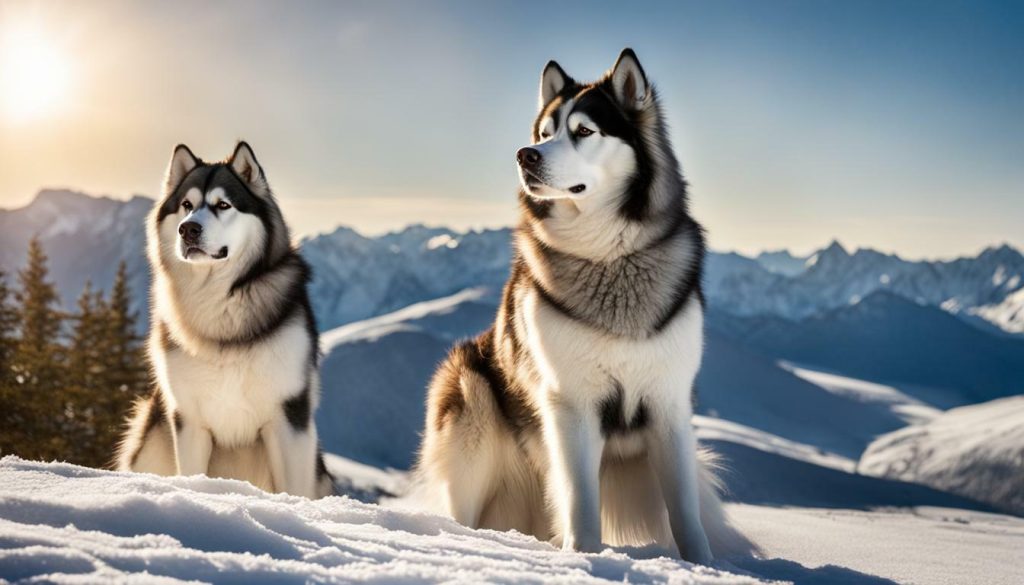
Alaskan Malamutes are not inherently dangerous, and with the right care and training, they can become loving and loyal companions in the right home. Despite their tough exterior, these dogs are known for their friendly and sociable nature. Aggressive behaviors in Malamutes are often a result of neglect or negative experiences, highlighting the importance of providing them with proper training and socialization.
While Alaskan Malamutes may not typically excel as guard dogs, their size and appearance can be intimidating. However, their true nature is that of a loyal and playful family pet. They have a strong prey drive, which means caution is needed when introducing them to other small animals. With the right guidance and supervision, they can coexist harmoniously with other pets.
Grooming and exercise are vital for the well-being of Alaskan Malamutes. Their thick coat requires regular grooming to prevent matting, and daily exercise is necessary to keep them physically and mentally stimulated. Additionally, like any breed, they have some genetic predispositions to health conditions such as hip dysplasia and dental problems. Regular vet check-ups and proper care are essential to address any potential health concerns.
In summary, Alaskan Malamutes are loving and loyal companions when given the care and attention they require. By understanding their temperament, providing proper training, and meeting their physical and mental needs, these magnificent dogs can thrive and bring joy to the right home. Consider welcoming an Alaskan Malamute into your family and experience the wonderful bond they can form with their human companions.
FAQ
Q: Are Alaskan Malamutes inherently dangerous?
A: No, Alaskan Malamutes are not inherently dangerous. They are loyal, playful, and confident dogs that make great family pets.
Q: What can contribute to aggression in Alaskan Malamutes?
A: Aggressive behaviors in Malamutes are usually a result of neglect or negative experiences. Proper training and socialization can help prevent aggression.
Q: Are Alaskan Malamutes good with people?
A: Yes, Alaskan Malamutes are friendly and sociable with people. They may appear intimidating due to their size, but they are generally friendly and not inclined to be guard dogs.
Q: How do Alaskan Malamutes behave around other pets?
A: Alaskan Malamutes have a high prey drive and may chase small animals. Caution is needed when introducing them to other pets, and proper supervision is important.
Q: What are the grooming and exercise needs of Alaskan Malamutes?
A: Alaskan Malamutes require regular grooming to maintain their thick coat and prevent matting. They also need daily exercise to keep them physically and mentally stimulated.
Q: What are some genetic health conditions in Alaskan Malamutes?
A: Alaskan Malamutes may be prone to certain health conditions such as hip dysplasia and dental problems. Regular vet check-ups and proper care are important to address potential health concerns.
Q: How can I ensure the well-being of my Alaskan Malamute?
A: Providing proper care, including grooming, exercise, nutrition, and regular visits to the veterinarian, is crucial for the well-being of Alaskan Malamutes.
Q: Are Alaskan Malamutes loving and loyal companions?
A: Yes, Alaskan Malamutes are known for their loving and loyal nature. They form strong bonds with their owners and make devoted companions.
Q: What are some common myths about Alaskan Malamutes?
A: Some common myths about Alaskan Malamutes include the belief that they are inherently dangerous or aggressive. The truth is that they are generally friendly and well-behaved when properly cared for.
Q: What is the truth about Alaskan Malamutes?
A: The truth about Alaskan Malamutes is that they are loyal, playful, and loving dogs that can make great family pets when provided with proper care, training, and socialization.
